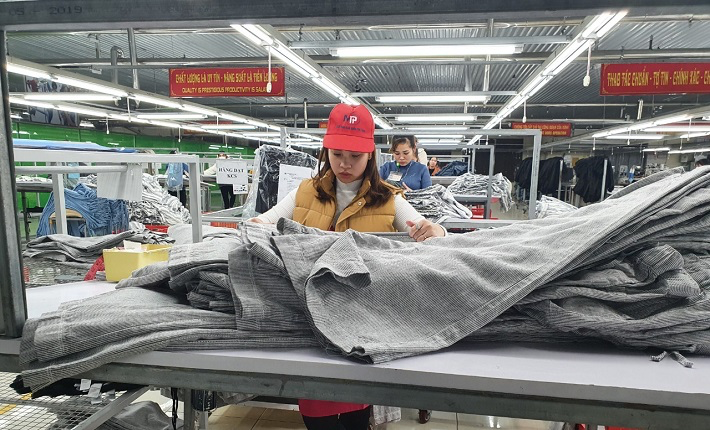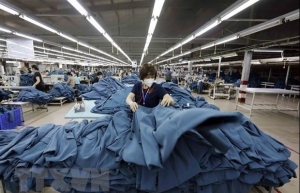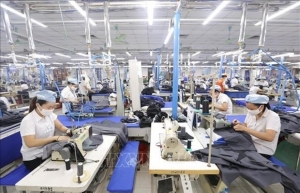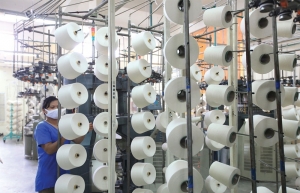Textiles and footwear industries face challenges
On February 17, two expert groups in Hanoi (Vietnam) and Paris (France) held a bilateral debate on opportunities and challenges for Vietnam Enterprises.
 |
| Illustrate image. Photo: VNA |
Luu Tien Chung, vice president of the Vietnam Textile and Apparel Association (VITAS), participated in the discussion and said, "To undertake quality human rights due diligence, the parties must make a firm commitment, clarifying the duties of each party as well as how to work cooperatively and share responsibilities."
"Execution of supply chain tracing at the level of the supplier company needs a roadmap and should begin with the pioneers who have more dedication, knowledge, and ability, as well as the resources to execute. In addition, brands and buyers must provide incentives for suppliers to retain and repeat industry-wide improvement initiatives.
In the areas where the parties may collaborate and assist one another, we feel it is crucial to prioritise employee concerns since personnel are the most significant element and the greatest drive for the partnership".
According to VITAS, Vietnam is one of the world's leading exporters of textile and footwear. For 2015–2022, the export turnover growth rate of garments and textiles, leather, and footwear averaged 64.3 per cent annually.
The share of exports to the European market is consistently substantial. According to the industry's official estimate, textile and apparel exports to EU nations will amount to $4.5 billion in 2022, or 12 per cent of the industry's overall export turnover.
The equivalent numbers for the leather and footwear sector are $6.9 billion and 24.5 per cent. Being from a nation with numerous companies and a large labour force producing and processing for European textiles and footwear, Vietnam is worried by the increasingly stringent criteria of consuming countries for inspection accountability.
Economists believe that, if done successfully and equitably, increasing traceability would raise the standard for Vietnam's textile and footwear sector, assist local enterprises in enhancing their corporate governance, and better the position and interests of employees.
Nguyen Van Binh, director of the Department of Legal Affairs at the Ministry of Labour, Invalids and Social Affairs, said that numerous sets of standards, diverse regulations pertaining to responsible business practises, and investigations of the industry, international brands, and market countries, businesses will face numerous challenges in meeting the requirements.
"State agencies must strengthen their executive functions by evaluating domestic legal rules and regulations to guarantee that the essence of these requirements is represented in national laws and policies. When businesses effectively apply domestic laws, they may satisfy fundamental criteria," Binh said.
"In addition to the role played by the state, brands and suppliers must be proactive and increase conversations to collaborate on synchronising the needs of various parties. Companies must help manufacturing companies so that they have more resources to make substantial changes, increase productivity, and protect employee rights."
The Free Trade Agreement between Vietnam and the EU that was concluded in 2019 has entered into force, contributing to enhanced trade between the two countries and allowing Vietnamese enterprises to participate in the global textile and footwear supply chains to a greater extent.
After a dramatic fall towards the end of 2020 owing to the pandemic, the share of Vietnam's textile and garment exports to the EU has shown indications of recovery, climbing by about 8 per cent in 2021 and 28.6 per cent in 2022, according to VITAS.
 | More responsible operations to help expand textile chains Vietnam’s textile and apparel sector is aiming to climb up the value chain, but export and distribution networks remain fundamental flaws. |
 | Apparel makers seek ways to overcome difficulties ahead With obstacles and challenges awaiting the garment and textile sector in the first half given a lack of recovery signal in global demand, most firms have prepared their schemes to overcome. |
 | Garment and textile groups cracking on with orders Despite woes from domestic and export markets, garment and textile businesses have been excited to start production in the new lunar year, finding out new opportunities and markets to reach the goals set forth. |
What the stars mean:
★ Poor ★ ★ Promising ★★★ Good ★★★★ Very good ★★★★★ Exceptional
Related Contents
Latest News
More News
- Masan Consumer names new deputy CEO to drive foods and beverages growth (February 23, 2026 | 20:52)
- Myriad risks ahead, but ones Vietnam can confront (February 20, 2026 | 15:02)
- Vietnam making the leap into AI and semiconductors (February 20, 2026 | 09:37)
- Funding must be activated for semiconductor success (February 20, 2026 | 09:20)
- Resilience as new benchmark for smarter infrastructure (February 19, 2026 | 20:35)
- A golden time to shine within ASEAN (February 19, 2026 | 20:22)
- Vietnam’s pivotal year for advancing sustainability (February 19, 2026 | 08:44)
- Strengthening the core role of industry and trade (February 19, 2026 | 08:35)
- Future orientations for healthcare improvements (February 19, 2026 | 08:29)
- Infrastructure orientations suitable for a new chapter (February 19, 2026 | 08:15)

 Tag:
Tag:



















 Mobile Version
Mobile Version